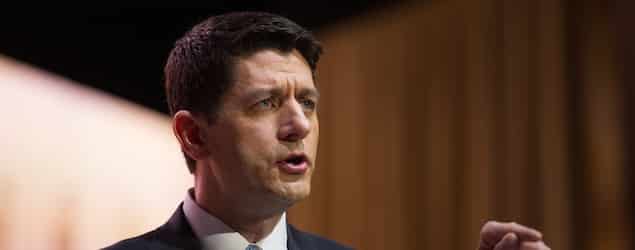Paul Ryan’s New Anti-Poverty Plan Would Be a Modest Improvement, But We Can Do Better

Paul Ryan just released a plan to reform the welfare state in order to encourage work and upward mobility. Ryan has long been worried that our “safety net” has become a “hammock,” lulling people into long-term dependency and punishing them for working: many poor Americans can actually lose money by getting a job and forgoing whatever handouts they were previously eligible for.
If you’re going to have a welfare state, it’s obviously better to have one that minimizes the incentive to stay on welfare, and from what I’ve seen, I suspect that a Ryan welfare state would be marginally less destructive than our current patchwork of so-called anti-poverty programs.
But of course that assumes we should have a welfare state. On this point, American Enterprise Institute scholar James Pethokoukis is pleased that Paul Ryan’s answer is an unambiguous “yes.” According to Pethokoukis, Ryan’s proposals show:
an endorsement of the safety net — with pro-work reforms, of course — that is currently lacking in some parts of the center-right community. A big part of a healthy American economy, Ryan said, “is having a strong safety net — both for those who can’t help themselves and for those who just need a helping hand.” Thomas Aquinas 1, Ayn Rand 0.
(The Thomas Aquinas reference hearkens back to a statement from Ryan stating that, contrary to those who label him an Objectivist, he prefers the Catholic philosopher Thomas Aquinas to Rand.)
It is misleading at best to suggest that opponents of the welfare state oppose a “safety net,” if that means they oppose mechanisms and institutions for helping “those who can’t help themselves and for those who just need a helping hand.” What we object to is a coercive government “safety net,” which forces people to sacrifice their hopes and dreams in order to give handouts to whomever the government deems worthy. As I discuss in my book RooseveltCare, a free market can provide people with all the help and security they need — privately and voluntarily, that is, without requiring anyone to sacrifice for anyone.
The real question is not whether we should have a “safety net” or not. The question is whether we should have a coercive welfare state. What I find offensive about Ryan’s (and by extension Pethokoukis’s) whole approach is that it doesn’t regard the rights and well-being of those forced to pay for the welfare state as worthy of much, if any, consideration. Instead, it starts by observing that some people are in need and jumps immediately to the question of what welfare state programs would most help them.
But that’s immoral. Just because there are people out there suffering and Ryan wants to help them doesn’t give him the right to concoct schemes that treat you and me and everyone who pays his own way as a means to Ryan’s supposedly noble ends. What about my goals and priorities? What about my right to pursue happiness? What about yours?
We can do better than Ryan’s plan. The greatest source of prosperity and opportunity is a free market. Free the market: that is the only moral way to improve the lives of Americans.



